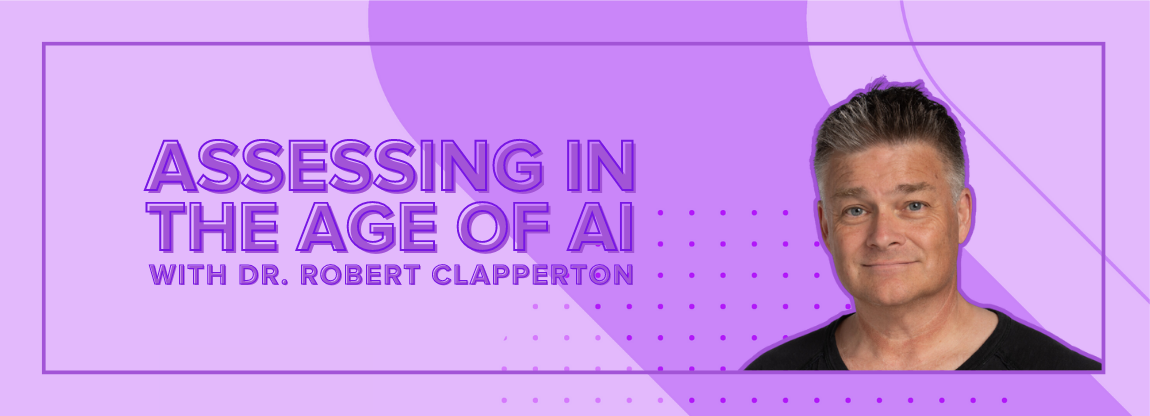Assessing in The Age of Artificial Intelligence
Assessing in The Age of Artificial Intelligence


In a thought-provoking session as part of our Debugging the Future Webinar Series, Associate Professor at Toronto Metropolitan University and Co-founder of Ametros Learning, Dr. Robert Clapperton delved into the profound impact of large language models on higher education and shared valuable insights on how educators and institutions can tailor their assessments in the age of artificial intelligence (AI).
If you would like to take part in future sessions in our ‘Debugging the Future’ Webinar Series, click here to register.
An Assistant Professor in the School of Professional Communications at Toronto Metropolitan University, Dr. Robert Clapperton specializes in computational linguistics, rhetoric, and critical discourse analysis, with an emphasis on the critical study of artificial intelligence and natural language understanding in several fields, including education. Dr. Clapperton is also the co-founder and director of Ametros Learning, a natural language understanding experiential learning platform for teaching and practicing communication, critical thinking, and emotional intelligence that’s used in universities across North America.
The webinar attracted a diverse and engaged audience of educators, administrators, and professionals eager to explore the evolving landscape of higher education. Dr. Clapperton, alongside enthusiastic attendees, exchanged ideas and practical suggestions, sparking a dynamic conversation around the integration of AI in assessments.
Below, we will delve into some of the actionable tips that emerged from the webinar, shedding light on the innovative ways educators are leveraging AI to enhance the assessment process and promote effective learning outcomes in face of AI generated content.
Let's explore some of the key takeaways from the discussion:
- Embrace Authentic Assessments
Attendees recognized the need to move beyond traditional assessment methods and embrace authentic assessments that closely mirror real-world scenarios. By incorporating AI into assessment design, educators can create dynamic and interactive experiences that challenge students to apply their knowledge in practical contexts. - Foster Critical Thinking Skills
Large language models present an opportunity to encourage critical thinking skills in students. Dr. Clapperton emphasized the importance of designing assessments that go beyond rote memorization and encourage students to analyze, evaluate, and synthesize information. AI-powered tools can provide personalized feedback and guide students towards more nuanced and thoughtful responses. - Design Ethical Assessments
As AI technologies advance, ethical considerations become increasingly important. The webinar highlighted the significance of ensuring fairness, transparency, and accountability in assessments. Would returning to in-person hand-written assessments negate the threat of AI generated content? Absolutely. But it could it disadvantage students with physical or neurological disabilities that might use technology as an accessibility device. Educators were encouraged to understand the limitations and biases of large language models and adopt practices that mitigate potential risks and biases surrounding assessments. - Promote Collaboration and Communication
AI-enabled assessments can foster collaboration and communication skills among students. Attendees shared innovative approaches, such as group projects and virtual simulations, that leveraged AI to facilitate collaboration, problem-solving, and effective communication within the digital learning environment. - Continuous Adaptation and Learning
The landscape of AI in education is ever-evolving. Both Dr. Clapperton and attendees emphasized the need for educators to stay informed and continuously adapt their approaches to leverage the potential of large language models effectively. This includes embracing new tools and methodologies, engaging in professional development opportunities, and sharing best practices within the education community.


By integrating these actionable tips into their educational practices, educators can leverage the transformative power of large language models (LLMs) to enhance assessments, foster critical thinking, and cultivate the skills necessary for the future workforce.
The session with Dr. Robert Clapperton provided a valuable platform for collaboratively exploring the possibilities and challenges presented by AI in higher education, inspiring educators to embrace innovation and reshape the assessment landscape for the benefit of their students.
To watch the full recorded session and discussion on-demand, click here – no registration required.

